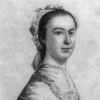Mercy Otis Warren

Mercy Otis Warren
Mercy Otis Warrenwas a political writer and propagandist of the American Revolution. In the eighteenth century, topics such as politics and war were thought to be the province of men. Few men and fewer women had the education or training to write about these subjects. Warren was an exception. During the years before the American Revolution, Warren published poems and plays that attacked royal authority in Massachusetts and urged colonists to resist British infringements on colonial rights and liberties...
NationalityAmerican
ProfessionPlaywright
Date of Birth14 September 1728
CountryUnited States of America
Democratic principles are the result of equality of condition.
The extraordinary exertions of the colonies, in cooperation with British measures, against the French, in the late war, were acknowledged by the British parliament to be more than adequate to their ability.
Public emergencies may require the hand of severity to fall heavily on those who are not personally guilty, but compassion prompts, and ever urges to milder methods
General Washington had rather incautiously encamped the bulk of his army on Long Island - a large and plentiful district about two miles from the city of New York
On the evening of December 25, General Washington in a most severe season crossed the Delaware with a part of his army, then reduced to less than 2000 men in the whole.
The honorable William Penn, late governor of Pennsylvania, was chosen agent to the Court of Britain, and directed to deliver the petition to the King himself and to endeavor by his personal influence to procure a favorable reception to this last address.
The love of domination and an uncontrolled lust of arbitrary power have prevailed among all nations and perhaps in proportion to the degrees of civilization.
The defeat of the Americans in Canada and the advantages gained by the British arms in the Jerseys, and indeed for some months in every other quarter, gave to the royal cause an air of triumph.
But truth is most likely to be exhibited by the general sense of contemporaries, when the feelings of the heart can be expressed without suffering itself to be disguised by the prejudices of man.
Before this address to my countrymen is closed, I beg leave to observe, that as a new century has dawned upon us, the mind is naturally led ot contemplate the great events that have run parallel with and have just closed the last.
A declaration of the independence of America, and the sovereignty of the United STates was drawn by the ingenious and philosophic pen of Thomas Jefferson, Esquire, a delegate from the state of Virginia
A superfluity of wealth, and a train of domestic slaves, naturally banish a sense of general liberty, and nourish the seeds of that kind of independence that usually terminates in aristocracy.
I am more and more convinced, of the propensity in human nature to tyranize over their fellow men....
The progress of the American Revolution has been so rapid and such the alteration of manners, the blending of characters, and the new train of ideas that almost universally prevail, that the principles which animated to the noblest exertions have been nearly annihilated.